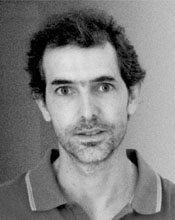Plenary Speaker - Olfa Kanoun

Olfa Kanoun
Technische Universität Chemnitz, Germany
Olfa.Kanoun@etit.tu-chemnitz.de
Olfa Kanoun received the Dipl.-Ing. Diploma from the Technical University in Munich (TUM) and the Dr.-Ing. degree from University of the Bundeswehr München Germany, in 1996 and 2001, respectively. She is since 2007 a full professor at Chemnitz University of Technology and a leading researcher in sensors, measurement systems and measurement methods. She has a deep experience in impedance spectroscopy, energy aware wireless sensors, energy harvesting and flexible sensors based on nanomaterials. She is the author or co-author of 14 books and more than 400 scientific contributions. Prof. Kanoun has been appointed as a Distinguished IEEE Lecturer. She is a recipient of research excellence awards, the faculty course award of IEEE Instrumentation and Measurement Society and several best papers awards.
Title: Body attached Sensors for Non-Invasive Human-Activity Monitoring and Personal Healthcare
Monday, September 14, 2020 – 15h30-16h30
Abstract:
Nowadays, the need for wearable sensors is increasing significantly in research and technology as they serve for manifold applications including medical diagnosis, ambient assisted living, mobility tracking, sports and rehabilitation. Internet of Things (IoT), wireless technologies, low-power electronic and flexible nanotechnology are therefore significantly driving the innovations in this field. Challenges thereby are mainly miniaturization, conformity and flexibility as well as signal processing and interpretation of the measured data.
Flexible and stretchable sensors have a light-weight, can be easily integrated and can better interface to the human skin. They can be used together with low-power electronics to realize sensor systems for monitoring human vital signs as well as monitoring of human activity in an efficient manner.
In this invited talk, we provide in the first part a review of the latest developments in flexible and wearable sensors based on carbonaceous nanomaterials and give a detailed insight about their sensing principles, technological aspects and applications as body attached sensors. In the second part we focus on an important non-invasive method, which is impedance spectroscopy, which is an efficient and safe method useful for tracking physiological changes and measurements on human organs. Bioimpedance spectroscopy has a great potential for use in medical diagnosis and human-activity monitoring.
Invited Speaker - Sancho Oliveira
Presentation title: Evolutionary Robotics - from Simulation to Real World Experiments
Monday, September 14, 2020 – 14h30-15h30

Sancho Oliveira
Iscte – Instituto Universitário de Lisboa
Dr. Sancho Oliveira is an Assistant professor at University Institute of Lisbon (ISCTE-IUL), Portugal, founder of BioMachines Lab, member at Institute of Telecommunications, and member of VFabLab ISCTE-IUL. His research focuses on autonomous robots, multirobot systems, swarm intelligence, evolutionary computation, communication in large-scale systems, complex systems and high performance computing. Sancho Oliveira has a PhD and Master in Physics from Universidade de Lisboa. He is graduated in Computer Engineering from Instituto Superior Técnico and has 13 years of experience in teaching in subjects like object-orientated programming, parallel and distributed programming, software for intelligent systems, computer architecture and physical computation.
Organizers:
IEEE IMS TC-13 and TC-1
